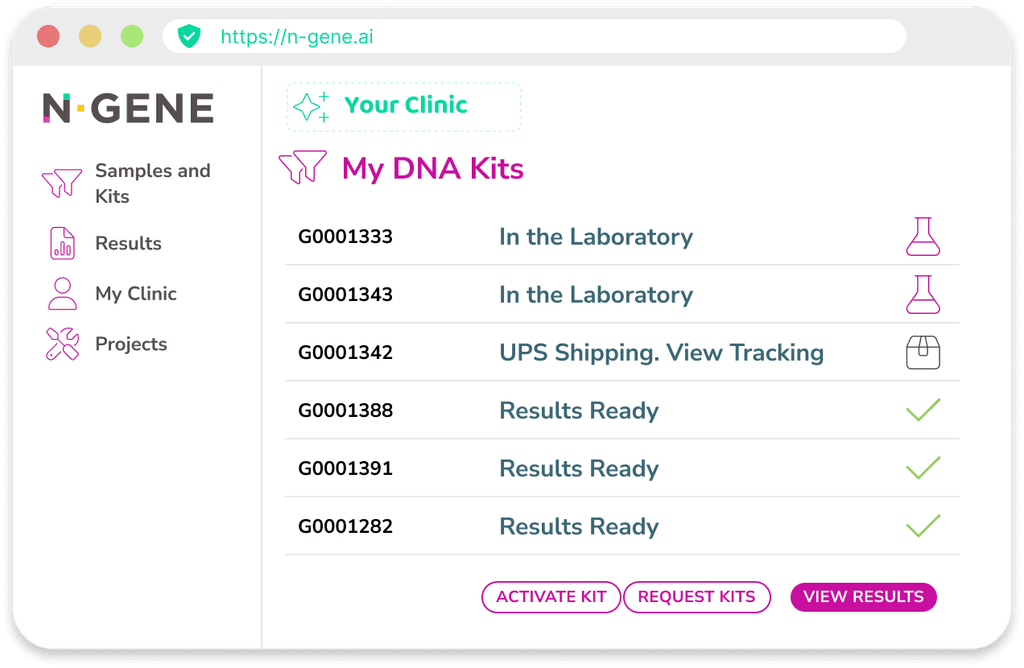The genetic solution for Healthcare Professionals
The genetic solution for Healthcare Professionals
The genetic solution for Healthcare Professionals
Integrate genetics into your practice with N-Gene, the software for healthcare professionals that offers customized solutions to your clients with genetic studies and helps grow your business.
Integrate genetics into your practice with N-Gene, the software for healthcare professionals that offers customized solutions to your clients with genetic studies and helps grow your business.



The most comprehensive
Explore our solutions
The most comprehensive
Explore our solutions
Multiple variants
Explore the predisposition and protection of:
Intolerances and celiac disease
Aspirin
The efficacy of aspirin may be conditioned by variants in genes such as PTGS1, PTGS2, CYP2C9 and UGT1A6, which are involved in the metabolism of the drug and in the inflammatory pathway. Mutations in these genes can modify the anti-inflammatory response and the risk of side effects.
Morphine
The response to morphine is modulated by genes such as OPRM1, UGT2B7 and ABCB1, which are involved in the binding of the drug to its receptors and its elimination from the body. Genetic variations can influence pain sensitivity, treatment efficacy, and the occurrence of side effects such as nausea, sedation, or dependence.
Nolotil
The metabolism of metamizole (Nolotil) is influenced by genes such as CYP2B6, CYP3A4 and ABCB1, which regulate both its biotransformation and transport in the body. Variants in these genes can alter analgesic efficacy or increase the likelihood of adverse reactions.
Paracetamol
The response to paracetamol may be influenced by genetic variants in genes such as UGT1A1, CYP1A2 and SULT1A1, involved in its hepatic metabolism. Alterations in these genes can affect the rate at which the drug is eliminated from the body, which could increase the risk of hepatic toxicity or reduce its effectiveness.
Intolerances and celiac disease
Aspirin
The efficacy of aspirin may be conditioned by variants in genes such as PTGS1, PTGS2, CYP2C9 and UGT1A6, which are involved in the metabolism of the drug and in the inflammatory pathway. Mutations in these genes can modify the anti-inflammatory response and the risk of side effects.
Morphine
The response to morphine is modulated by genes such as OPRM1, UGT2B7 and ABCB1, which are involved in the binding of the drug to its receptors and its elimination from the body. Genetic variations can influence pain sensitivity, treatment efficacy, and the occurrence of side effects such as nausea, sedation, or dependence.
Nolotil
The metabolism of metamizole (Nolotil) is influenced by genes such as CYP2B6, CYP3A4 and ABCB1, which regulate both its biotransformation and transport in the body. Variants in these genes can alter analgesic efficacy or increase the likelihood of adverse reactions.
Paracetamol
The response to paracetamol may be influenced by genetic variants in genes such as UGT1A1, CYP1A2 and SULT1A1, involved in its hepatic metabolism. Alterations in these genes can affect the rate at which the drug is eliminated from the body, which could increase the risk of hepatic toxicity or reduce its effectiveness.
Intolerances and celiac disease
Aspirin
The efficacy of aspirin may be conditioned by variants in genes such as PTGS1, PTGS2, CYP2C9 and UGT1A6, which are involved in the metabolism of the drug and in the inflammatory pathway. Mutations in these genes can modify the anti-inflammatory response and the risk of side effects.
Morphine
The response to morphine is modulated by genes such as OPRM1, UGT2B7 and ABCB1, which are involved in the binding of the drug to its receptors and its elimination from the body. Genetic variations can influence pain sensitivity, treatment efficacy, and the occurrence of side effects such as nausea, sedation, or dependence.
Nolotil
The metabolism of metamizole (Nolotil) is influenced by genes such as CYP2B6, CYP3A4 and ABCB1, which regulate both its biotransformation and transport in the body. Variants in these genes can alter analgesic efficacy or increase the likelihood of adverse reactions.
Paracetamol
The response to paracetamol may be influenced by genetic variants in genes such as UGT1A1, CYP1A2 and SULT1A1, involved in its hepatic metabolism. Alterations in these genes can affect the rate at which the drug is eliminated from the body, which could increase the risk of hepatic toxicity or reduce its effectiveness.
Antibiotics
Antibiotics
Antibiotics
Contraceptives
Contraceptives
Contraceptives
Antihistamines / Immunosuppressants
Antihistamines / Immunosuppressants
Antihistamines / Immunosuppressants
Anti-hair loss treatments
Anti-hair loss treatments
Anti-hair loss treatments
Antifungals and antivirals
Antifungals and antivirals
Antifungals and antivirals
Antipsychotics and antidepressants
Antipsychotics and antidepressants
Antipsychotics and antidepressants
Cardiovascular drugs
Cardiovascular drugs
Cardiovascular drugs
Others
Others
Others
Save time
Save time
Explore genetic data easily
Register your patients
Request kits and pickups
Generate reports in PDF
Receive AI-powered insights
Register your patients
Monitor the progress of your clients' samples efficiently: assign an alias to every sample and track its status instantly

Register your patients
Request kits and pickups
Generate reports in PDF
Receive AI-powered insights

Register your patients
Monitor the progress of your clients' samples efficiently: assign an alias to every sample and track its status instantly
Register your patients
Request kits and pickups
Generate reports in PDF
Receive AI-powered insights

Register your patients
Monitor the progress of your clients' samples efficiently: assign an alias to every sample and track its status instantly
Shall we talk?
Shall we talk?
Shall we talk?
Contact us and request a demo without obligation
Contact us and request a demo without obligation
Contact us and request a demo without obligation
Our experts will provide you with a demonstration of N-GENE and will answer all your questions. Discover all the advantages of integrating genetics into your practice.
Our experts will provide you with a demonstration of N-GENE and will answer all your questions. Discover all the advantages of integrating genetics into your practice.
Our experts will provide you with a demonstration of N-GENE and will answer all your questions. Discover all the advantages of integrating genetics into your practice.
Contact us on WhatsApp

Do You Need to Know More?
Frequently Asked Questions
Frequently Asked Questions
Do I need to be an expert in genetics to interpret the reports?
Do I need to be an expert in genetics to interpret the reports?
Do I need to be an expert in genetics to interpret the reports?
How do I collect the samples from my patients?
How do I collect the samples from my patients?
How do I collect the samples from my patients?
Are the results reliable?
Are the results reliable?
Are the results reliable?
Can this test be used as a diagnosis?
Can this test be used as a diagnosis?
Can this test be used as a diagnosis?
Where do I send the samples and what technology do you use?
Where do I send the samples and what technology do you use?
Where do I send the samples and what technology do you use?
Is it necessary to repeat the test after a few months?
Is it necessary to repeat the test after a few months?
Is it necessary to repeat the test after a few months?
How is the privacy of the samples handled?
How is the privacy of the samples handled?
How is the privacy of the samples handled?
Discover how N-GENE can transform your medical consultation
Discover how N-GENE can transform your medical consultation
Fundamental today, essential tomorrow
The genetic reports from N-GENE are informative and preventive. They do not constitute a medical diagnosis nor do they substitute for individual clinical assessment.
The genetic reports from N-GENE are informative and preventive. They do not constitute a medical diagnosis nor do they substitute for individual clinical assessment.
The genetic reports from N-GENE are informative and preventive. They do not constitute a medical diagnosis nor do they substitute for individual clinical assessment.







